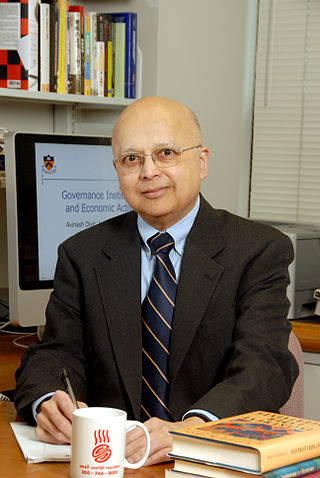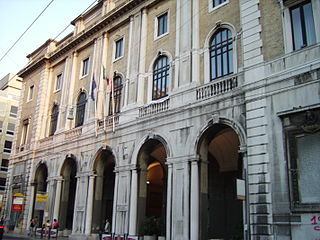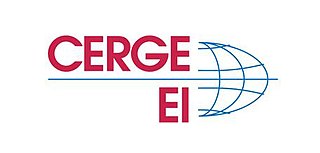Related Research Articles

Joseph Eugene Stiglitz is an American New Keynesian economist, a public policy analyst, political activist, and a professor at Columbia University. He is a recipient of the Nobel Memorial Prize in Economic Sciences (2001) and the John Bates Clark Medal (1979). He is a former senior vice president and chief economist of the World Bank. He is also a former member and chairman of the US Council of Economic Advisers. He is known for his support for the Georgist public finance theory and for his critical view of the management of globalization, of laissez-faire economists, and of international institutions such as the International Monetary Fund and the World Bank.

Robert Merton Solow, GCIH was an American economist and Nobel laureate whose work on the theory of economic growth culminated in the exogenous growth model named after him.
Economists use the term representative agent to refer to the typical decision-maker of a certain type.
Econophysics is a non-orthodox interdisciplinary research field, applying theories and methods originally developed by physicists in order to solve problems in economics, usually those including uncertainty or stochastic processes and nonlinear dynamics. Some of its application to the study of financial markets has also been termed statistical finance referring to its roots in statistical physics. Econophysics is closely related to social physics.

Çukurova University is a public university in Adana, Turkey. The university has sixteen faculties, three colleges, seven vocational colleges, three institutes and twenty-six research and application centers. The university campus is located 10 kilometres (6.2 mi) away from Adana city center, by the Seyhan Dam Lake.

The Polytechnic University of Milan is the largest technical university in Italy, with about 40,000 students. The university offers undergraduate, graduate, and higher education courses in the fields of engineering, architecture and design.
Sanford "Sandy" Jay Grossman is an American economist and hedge fund manager specializing in quantitative finance. Grossman’s research has spanned the analysis of information in securities markets, corporate structure, property rights, and optimal dynamic risk management. He has published widely in leading economic and business journals, including American Economic Review, Journal of Econometrics, Econometrica, and Journal of Finance. His research in macroeconomics, finance, and risk management has earned numerous awards. Grossman is currently Chairman and CEO of QFS Asset Management, an affiliate of which he founded in 1988. QFS Asset Management shut down its sole remaining hedge fund in January 2014.

Avinash Kamalakar Dixit is an Indian-American economist. He is the John J. F. Sherrerd '52 University Professor of Economics Emeritus at Princeton University, and has been Distinguished Adjunct Professor of Economics at Lingnan University, senior research fellow at Nuffield College, Oxford and Sanjaya Lall Senior Visiting Research Fellow at Green Templeton College, Oxford.
In economics, an agent is an actor in a model of some aspect of the economy. Typically, every agent makes decisions by solving a well- or ill-defined optimization or choice problem.

Marche Polytechnic University or Polytechnic University of the Marches is a public university in Ancona, Italy. It offers undergraduate and graduate degrees in Agriculture, Engineering, Economics, Medicine and Biology.
Carl Eugene Walsh, is an American economist. He has been an economics professor at the University of California, Santa Cruz (UCSC) since 1987, and retired in 2020 as Distinguished Professor of Economics. He twice served as chair of the Economics Department at the university as well as Vice Provost for Silicon Valley Initiatives (2005-2007) and Associate Vice Chancellor for Planning and Programs (1995-1995) at UCSC. He has also been a Visiting Scholar at the Federal Reserve Banks of Kansas City (1982-1983), Philadelphia (1984-1985) and San Francisco (1987-2000).
Whither Socialism? is a book on economics by Joseph Stiglitz, first published in 1994 by MIT Press.

The Center for Economic Research and Graduate Education – Economics Institute, known as CERGE-EI is an academic institution in Prague, Czech Republic, specialised in economics. The institute is a partnership between the Center for Economic Research and Graduate Education of Charles University and the Economics Institute of the Czech Academy of Sciences. It is also a New York State Education Department entity with a permanent charter for its degree-granting educational programs awarded by the New York State Board of Regents. It is located in the Schebek Palace in the center of Prague.

Beatrice Weder di Mauro is a Swiss economist who is currently Professor of economics at the Graduate Institute of International and Development Studies in Geneva, Research Professor and Distinguished Fellow-in-residence at the Emerging Markets Institute of INSEAD Singapore, and senior fellow at the Asian Bureau of Finance and Economic Research (ABFER). Since 2018, she also serves as President of the Centre for Economic Policy Research (CEPR).
Michael Rothschild is an American economist. He is a professor at the University of California, Los Angeles (UCLA), and a former dean at Princeton.

Jean-Paul Fitoussi was a French economist and sociologist of Sephardi Jewish descent.
Mauro Leo Baranzini is a Swiss economist of the Cambridge Post-Keynesian school of thought. He was a student of Bruno Caizzi at the Scuola Superiore di Commercio of Bellinzona; of Pietro Balestra and Bernard Schmitt at the University of Fribourg, Switzerland; of David Soskice, John S. Flemming and Sir James A. Mirrlees at Oxford. Later on, while at the University of Cambridge, U.K., he came under the influence of the two senior post-Keynesian economists: Luigi Lodovico Pasinetti and Geoff Harcourt. He has written extensively with Roberto Scazzieri, of the Universities of Bologna and Cambridge and of the Lincei Academy. His contributions are mainly in the field of income and wealth distribution, both at the macro- and micro-level. In particular he has fruitfully incorporated into the post-Keynesian model of distribution and accumulation the well-known life-cycle theory of Ando-Brumberg&Modigliani, within an overlapping-generations model, and with a strong bequest motive.

Willi Semmler is a German born American economist who currently teaches at The New School in New York.
The Department of Economics is an academic department of the University of Oxford within the Social Sciences Division. Relatively recently founded in 1999, the department is located in the Norman Foster-designed Manor Road Building.
References
- ↑ Farmer, J. Doyne & Foley, Duncan (6 August 2009). "The Economy Needs Agent-Based Modelling". Nature. 460: 685-686.
- ↑ Curriculum accademico sul sito dell'Università Politecnica delle Marche.
- ↑ "Guida Insegnamenti".
- ↑ "The Scientific Board of the Society". eshia.bwl.uni-kiel.de. Retrieved 8 July 2024.
- ↑ Gallegati, Mauro on IDEAS.
- ↑ Gallegati, Mauro & Stiglitz, Joseph E. (1992). "Stochastic and deterministic fluctuations in a non-linear model with equity rationing". Giornale degli economisti ed annali di economia. n. 51: 97–108
- ↑ Mauro Gallegati Archived 4 March 2013 at the Wayback Machine , INET website.